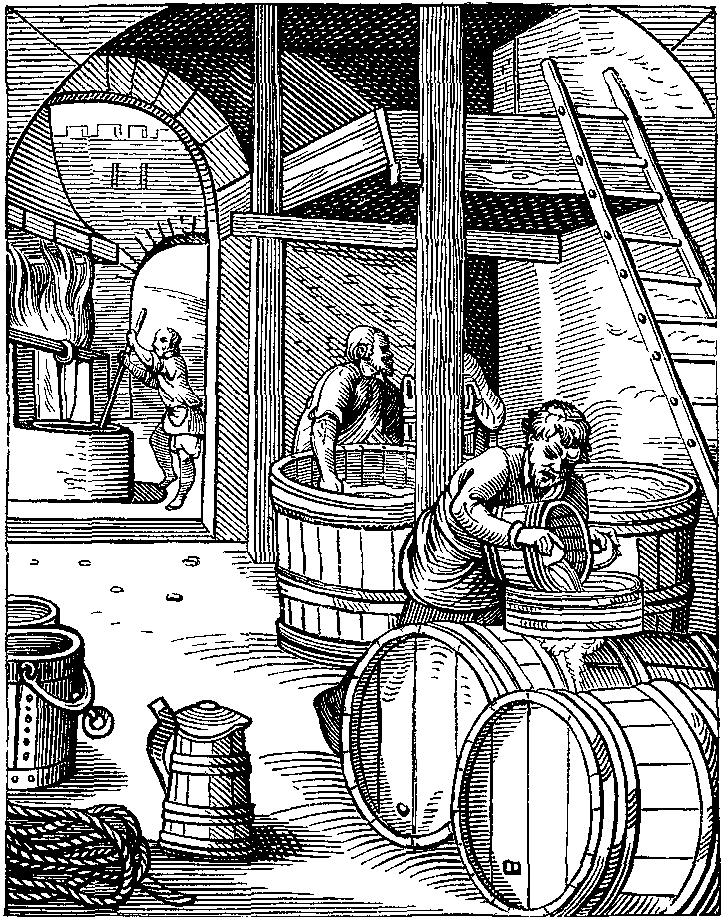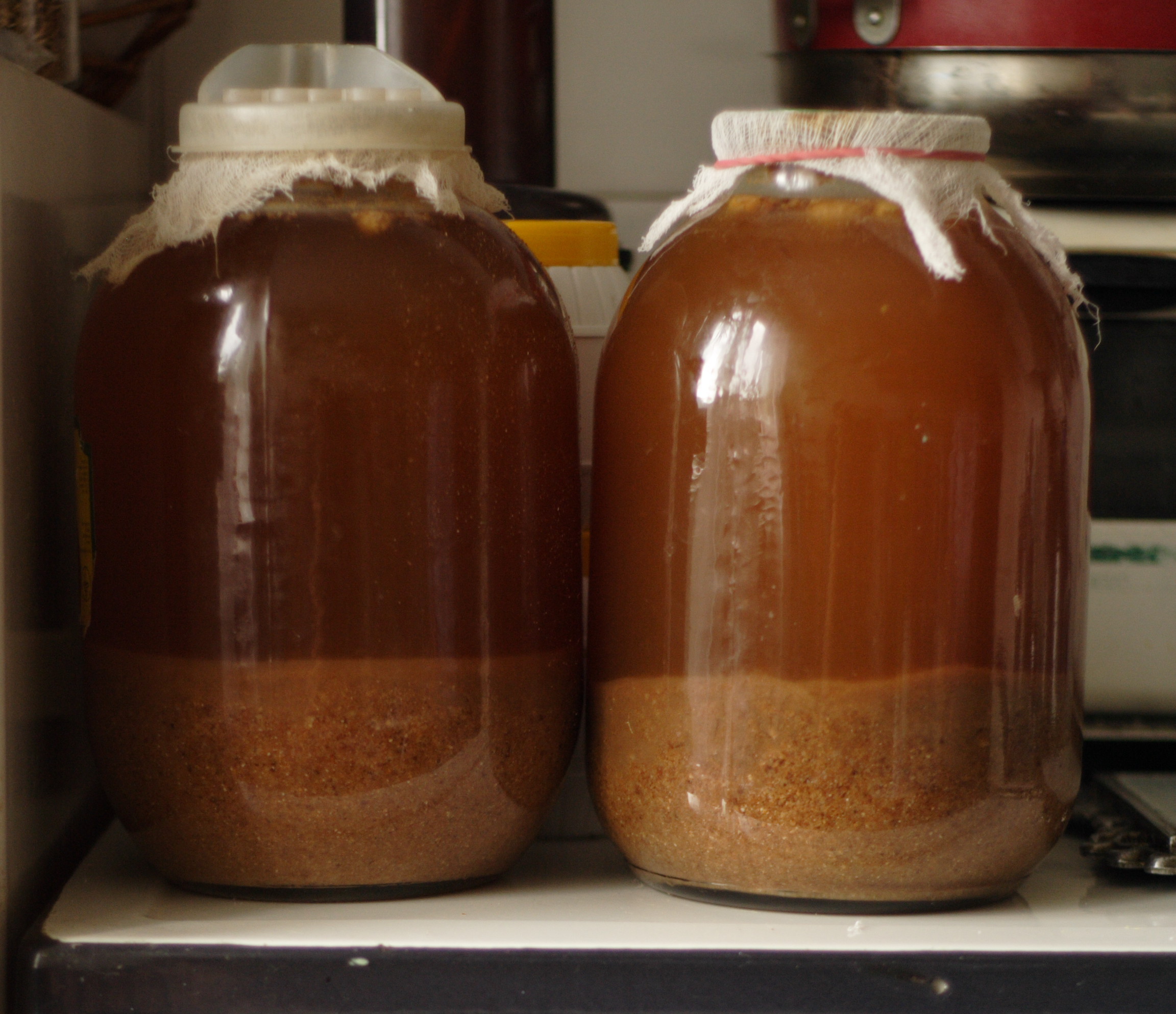|
Beer From Bread
upA 330ml can of ABV), made using bread, flavoured with Earl Grey tea, brewed by Adnams Although most beer is brewed using cereal grains—most commonly malted barley—as a source of starch sugars, it can also be made from bread. Beers made from bread include Sahti in Finland, Kvass in Russia and Ukraine, and Bouza in Egypt and Sudan. In several countries, 'Toast Ale' is made—in a range of styles—from surplus bread from the catering trade, as part of a campaign to reduce food waste. The recipe is open source. Inspired by this, Adnams brewed a range of three beers exclusively for Marks & Spencer in 2018, using leftover bread from the store's sandwich suppliers. All the waste bread was then used as animal feed Animal feed is food given to domestic animals, especially livestock, in the course of animal husbandry. There are two basic types: fodder and forage. Used alone, the word ''feed'' more often refers to fodder. Animal feed is an important input to .... References ... [...More Info...] [...Related Items...] OR: [Wikipedia] [Google] [Baidu] |
Earl Grey Pale Ale Can - Andy Mabbett
Earl () is a rank of the nobility in the United Kingdom. The title originates in the Old English word ''eorl'', meaning "a man of noble birth or rank". The word is cognate with the Old Norse, Scandinavian form ''jarl'', and meant "Germanic chieftain, chieftain", particularly a chieftain set to rule a territory in a king's stead. After the Norman conquest of England, Norman Conquest, it became the equivalent of the continental count (in England in the earlier period, it was more akin to a duke; in Scotland, it assimilated the concept of mormaer). Alternative names for the rank equivalent to "earl" or "count" in the nobility structure are used in other countries, such as the ''hakushaku'' (伯爵) of the post-restoration Japanese Imperial era. In modern Britain, an earl is a member of the Peerages in the United Kingdom, peerage, ranking below a marquess and above a viscount. A feminine form of ''earl'' never developed; instead, ''countess'' is used. Etymology The term ''ear ... [...More Info...] [...Related Items...] OR: [Wikipedia] [Google] [Baidu] |
Food Waste
Food loss and waste is food that is not eaten. The causes of food waste or loss are numerous and occur throughout the food system, during production, processing, distribution, retail and food service sales, and consumption. Overall, about one-third of the world's food is thrown away. A 2021 metaanalysis that did not include food lost during production, by the United Nations Environment Programme found that food waste was a challenge in all countries at all levels of economic development. The analysis estimated that global food waste was 931 million tonnes of food waste (about 121 kg per capita) across three sectors: 61 per cent from households, 26 per cent from food service and 13 per cent from retail. Food loss and waste is a major part of the impact of agriculture on climate change (it amounts to 3.3 billion tons of CO2e emissions annually) and other environmental issues, such as land use, water use and loss of biodiversity. Prevention of food waste is t ... [...More Info...] [...Related Items...] OR: [Wikipedia] [Google] [Baidu] |
Brewing
Brewing is the production of beer by steeping a starch source (commonly cereal grains, the most popular of which is barley) in water and fermenting the resulting sweet liquid with yeast. It may be done in a brewery by a commercial brewer, at home by a homebrewer, or communally. Brewing has taken place since around the 6th millennium BC, and archaeological evidence suggests that emerging civilizations, including ancient Egypt and Mesopotamia, brewed beer. Since the nineteenth century the brewing industry has been part of most western economies. The basic ingredients of beer are water and a fermentable starch source such as malted barley. Most beer is fermented with a brewer's yeast and flavoured with hops. Less widely used starch sources include millet, sorghum and cassava. Secondary sources (adjuncts), such as maize (corn), rice, or sugar, may also be used, sometimes to reduce cost, or to add a feature, such as adding wheat to aid in retaining the foamy head of the beer. ... [...More Info...] [...Related Items...] OR: [Wikipedia] [Google] [Baidu] |
Bread Dishes
Bread is a staple food prepared from a dough of flour (usually wheat) and water, usually by baking. Throughout recorded history and around the world, it has been an important part of many cultures' diet. It is one of the oldest human-made foods, having been of significance since the dawn of Agriculture#History, agriculture, and plays an essential role in both religious rituals and secular culture. Bread may be Leavening agent, leavened by naturally occurring microbes (e.g. sourdough), chemicals (e.g. baking soda), industrially produced Baker's yeast, yeast, or high-pressure aeration, which creates the gas bubbles that fluff up bread. In many countries, commercial bread often contains additives to improve flavor, texture, color, shelf life, nutrition, and ease of production. History Bread is one of the oldest prepared foods. Evidence from 30,000 years ago in Europe and Australia revealed starch residue on rocks used for pounding plants. It is possible that during this time, ... [...More Info...] [...Related Items...] OR: [Wikipedia] [Google] [Baidu] |
Animal Feed
Animal feed is food given to domestic animals, especially livestock, in the course of animal husbandry. There are two basic types: fodder and forage. Used alone, the word ''feed'' more often refers to fodder. Animal feed is an important input to animal agriculture, and is frequently the main cost of the raising or keeping of animals. Farms typically try to reduce cost for this food, by growing their own, grazing animals, or supplementing expensive feeds with substitutes, such as food waste like spent grain from beer brewing. Animal wellbeing is highly dependent on feed that reflects a well balanced nutrition. Some modern agricultural practices, such as fattening cows on grains or in feed lots, have detrimental effects on the environment and animals. For example, increased corn or other grain in feed for cows, makes their microbiomes more acidic weakening their immune systems and making cows a more likely vector for E.coli. While other feeding practices can improve animal impa ... [...More Info...] [...Related Items...] OR: [Wikipedia] [Google] [Baidu] |
Marks & Spencer
Marks and Spencer Group plc (commonly abbreviated to M&S and colloquially known as Marks's or Marks & Sparks) is a major British multinational retailer with headquarters in Paddington, London that specialises in selling clothing, beauty, home products and food products. It is listed on the London Stock Exchange and is a constituent of the FTSE 250 Index; it had previously been in the FTSE 100 Index from its creation until 2019. M&S was founded in 1884 by Michael Marks and Thomas Spencer in Leeds. M&S currently has 959 stores across the UK, including 615 that only sell food products and through its television advertising, asserts the exclusive nature and luxury of its food and beverages. It also offers an online food delivery service through a joint venture with Ocado. In 1998, the company became the first British retailer to make a pre-tax profit of over £1 billion, although it then went into a sudden slump taking the company and its stakeholders by surprise. In Nove ... [...More Info...] [...Related Items...] OR: [Wikipedia] [Google] [Baidu] |
Adnams Brewery
Adnams is a regional brewery founded in 1872 in Southwold, Suffolk, England, by George and Ernest Adnams. It produces cask ale and bottled beers. Annual production is around 85,000 barrels. In 2010, the company established the Copper House distillery for the production of gin, vodka and whisky. History The earliest recorded brewing on the Adnams site was in 1396 by Johanna de Corby. The Sole Bay Brewery in Southwold was purchased in 1872 by George and Ernest Adnams. The company was incorporated in 1890, and has remained independent since then, producing a range of beers for distribution mainly in East Anglia. The Adnams family was joined in 1902 by Pierse Loftus, who brought strategic vision, technical expertise and sound financial principles, building the base on which succeeding generations have been able to build. Adnams is now a PLC, with numerous shareholders, but still has family representation on the board, with Jonathan Adnams as chairman. The yeast used by Adnam ... [...More Info...] [...Related Items...] OR: [Wikipedia] [Google] [Baidu] |
Open Source
Open source is source code that is made freely available for possible modification and redistribution. Products include permission to use the source code, design documents, or content of the product. The open-source model is a decentralized software development model that encourages open collaboration. A main principle of open-source software development is peer production, with products such as source code, blueprints, and documentation freely available to the public. The open-source movement in software began as a response to the limitations of proprietary code. The model is used for projects such as in open-source appropriate technology, and open-source drug discovery. Open source promotes universal access via an open-source or free license to a product's design or blueprint, and universal redistribution of that design or blueprint. Before the phrase ''open source'' became widely adopted, developers and producers have used a variety of other terms. ''Open source'' gai ... [...More Info...] [...Related Items...] OR: [Wikipedia] [Google] [Baidu] |
The Daily Telegraph
''The Daily Telegraph'', known online and elsewhere as ''The Telegraph'', is a national British daily broadsheet newspaper published in London by Telegraph Media Group and distributed across the United Kingdom and internationally. It was founded by Arthur B. Sleigh in 1855 as ''The Daily Telegraph & Courier''. Considered a newspaper of record over ''The Times'' in the UK in the years up to 1997, ''The Telegraph'' generally has a reputation for high-quality journalism, and has been described as being "one of the world's great titles". The paper's motto, "Was, is, and will be", appears in the editorial pages and has featured in every edition of the newspaper since 19 April 1858. The paper had a circulation of 363,183 in December 2018, descending further until it withdrew from newspaper circulation audits in 2019, having declined almost 80%, from 1.4 million in 1980.United Newspapers PLC and Fleet Holdings PLC', Monopolies and Mergers Commission (1985), pp. 5–16. Its ... [...More Info...] [...Related Items...] OR: [Wikipedia] [Google] [Baidu] |
Bouza (beer)
Beer in Egypt has long held a significant role, and its presence in the country is thought to date back to the Predynastic period. In ancient Egypt wine was preferred by the upper class, whereas beer was a staple for working class Egyptians and a central part of their diet. Despite religious restrictions and conflicting views on alcohol after the Muslim conquest of Egypt, the consumption of beer did not cease, and it still remains the most popular alcoholic beverage in the country by far, accounting for 54 percent of all alcohol consumption. History The modern beer industry in Egypt was founded by Belgian businessmen in 1897, with the establishment of Crown Brewery in Alexandria and later the Pyramid Brewery in Giza. Both breweries produced and sold a beer named Stella, each based on completely different recipes. In 1937 Heineken International became a major shareholder in both breweries. This acquisition coincided with growing nationalist sentiment and a political drive for ... [...More Info...] [...Related Items...] OR: [Wikipedia] [Google] [Baidu] |
Beer
Beer is one of the oldest and the most widely consumed type of alcoholic drink in the world, and the third most popular drink overall after water and tea. It is produced by the brewing and fermentation of starches, mainly derived from cereal grains—most commonly from malted barley, though wheat, maize (corn), rice, and oats are also used. During the brewing process, fermentation of the starch sugars in the wort produces ethanol and carbonation in the resulting beer.Barth, Roger. ''The Chemistry of Beer: The Science in the Suds'', Wiley 2013: . Most modern beer is brewed with hops, which add bitterness and other flavours and act as a natural preservative and stabilizing agent. Other flavouring agents such as gruit, herbs, or fruits may be included or used instead of hops. In commercial brewing, the natural carbonation effect is often removed during processing and replaced with forced carbonation. Some of humanity's earliest known writings refer to the productio ... [...More Info...] [...Related Items...] OR: [Wikipedia] [Google] [Baidu] |
Kvass
Kvass is a fermented cereal-based Alcohol by volume, low alcoholic beverage with a slightly cloudy appearance, light-brown colour and sweet-sour taste. It may be flavoured with berries, fruits, herbs or honey. Kvass stems from the northeastern part of Europe, where the grain production is thought to have been insufficient for beer to become a daily drink. The first written mention of kvass is found in the ''Primary Chronicle'', describing the celebration of Vladimir the Great's baptism in 996. In the traditional method, kvass is made from a mash obtained from rye bread or rye flour and malt soaked in hot water, fermented for about 12 hours with the help of sugar and bread yeast or baker's yeast at a room temperature. In industrial methods, kvass is produced from wort concentrate combined with various grain mixtures. It is a popular drink in Russia, Ukraine, Poland, Baltic countries, Finland and some parts of China. Terminology The word ''kvass'' is ultimately from Proto-Indo-Eu ... [...More Info...] [...Related Items...] OR: [Wikipedia] [Google] [Baidu] |









